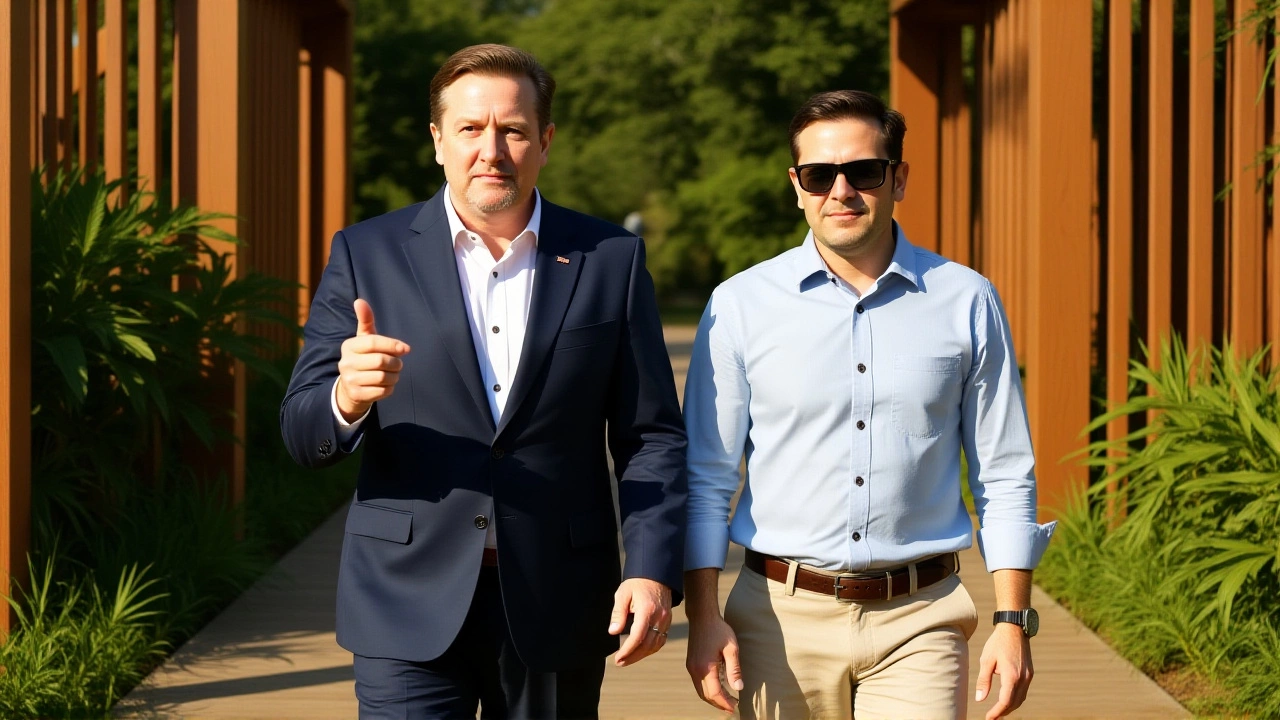When Marco Rubio, U.S. Secretary of State touched down in Panama City on February 1, 2025, he kicked off a six‑day Central America diplomatic tourPanama aimed at tightening migration controls, cracking down on transnational crime, and pushing back Chinese influence across the hemisphere. The itinerary marched through Panama, El Salvador, Costa Rica, Guatemala and the Dominican Republic, echoing President Donald Trump’s “America First” foreign‑policy agenda. In each capital, Rubio met senior officials, business leaders and civil‑society representatives to seal deals that could reshape how the United States manages illegal crossings, prison overcrowding and regional security.
Background: The Trump Administration’s Push in Latin America
The tour was announced on January 31, 2025, by Tammy Bruce, a spokesperson for the U.S. Department of State. The State Department framed the mission as a “tour of core, shared interests”: stopping large‑scale migration, dismantling drug‑trafficking networks, countering the People’s Republic of China, and deepening economic ties that funnel Central‑American goods into U.S. supply chains. The backdrop includes a sudden February 2 order that effectively shuttered the USAID presence in the region, leaving dozens of expatriate staff in limbo.
El Salvador: Unprecedented Deportation Offer and Prison‑Outsourcing Deal
Rubio’s first high‑profile stop after Panama was San Salvador, where he sat down with Nayib Bukele, the 44‑year‑old president known for his “hard‑line” approach to gangs. Bukele announced what he called “the most unprecedented, extraordinary migratory agreement anywhere in the world.” In a tweet that went viral, he offered to accept any U.S. deportees—regardless of nationality—on the condition that the United States pay a modest fee to house them in the newly built Terrorism Confinement Center, a 40‑kilometre‑long mega‑prison.
“We are ready to outsource part of America’s prison system,” Bukele wrote on X. He added that the fee would be “relatively low for the U.S. but significant for us, making our entire prison system sustainable.” While U.S. law bars the deportation of its own citizens, the agreement does allow for the transfer of non‑citizen illegal‑residents and, oddly, even U.S. lawful permanent residents who have been convicted of serious crimes.
Rubio emphasized that El Salvador would also cooperate fully on the repatriation of Salvadoran nationals living in the United States without legal status. The deal, if fully implemented, could see up to 5,000 detainees moved to the Salvadoran facility each year—a figure that has sparked debate in Washington’s congressional oversight committees.
Guatemala: New Border Force and a Projected 40% Spike in Deportations
Next, Rubio flew to Guatemala City on February 3, where he met President Bernardo Arévalo. Arévalo, who took office in January 2024, announced that Guatemala would accept third‑country nationals deported from the United States, positioning the nation as a regional hub for processing returns.
“The permanent answer to immigration is development,” Arévalo told reporters, “but until then we must manage the flows responsibly.” He also unveiled a new, joint police‑military border security force to patrol the borders with Honduras and El Salvador, aiming to curb smuggling, narcotics trafficking, and gang infiltration.
The Guatemalan administration projected that deportations could rise by as much as 40 percent over the next six months, a surge backed by the U.S. State Department and the Department of Homeland Security’s renewed enforcement directives. In a closed‑door briefing at the U.S. Embassy, Rubio reassured staff members whose future had been thrown into uncertainty by the abrupt dismantling of USAID, noting that the upcoming bilateral programs would still fund critical migration‑management infrastructure.

Costa Rica: Security Cooperation, Cyber‑defence and Advanced Manufacturing
On February 4, the delegation arrived in San José to meet President Rodrigo Chaves Robles. The conversation, which came on the heels of the sudden death of a senior Costa Rican official named Zamora, centered on a renewed cooperation roadmap.
Chaves highlighted Costa Rica’s status as “one of the most prosperous countries in Latin America” and a key destination for migrants from Nicaragua and beyond. He noted that organized‑crime groups have increasingly infiltrated the country’s financial sector, prompting a request for U.S. waivers that would keep aid flowing to anti‑trafficking units.
Rubio pledged “generous” continued assistance, especially in the realm of cybersecurity. Both leaders agreed to launch a joint cyber‑threat‑monitoring centre, leveraging U.S. expertise to protect Costa Rican critical infrastructure from ransomware attacks that have spiked by 27 percent year‑over‑year.
Economically, the talks shone a spotlight on Costa Rica’s emerging advanced‑manufacturing sector, which has benefited from the CHIPS Act incentives. Rubio suggested that U.S. firms could partner with Costa Rican firms to develop near‑shoring supply chains for electronics, thereby reducing reliance on Asian factories.
Implications: Migration Policy, Regional Security and China’s Footprint
The tour’s agenda reflects a broader strategic shift: the United States is moving from humanitarian‑focused aid toward enforcement‑oriented partnerships. By offering El Salvador a cash‑for‑prison deal and encouraging Guatemala to host third‑country deportees, Washington is essentially outsourcing a piece of its immigration enforcement to allies willing to shoulder the fiscal and political costs.
Security‑wise, the new Guatemalan border force and Costa Rican cyber‑centre signal a multi‑pronged approach to transnational threats. Both steps echo concerns that the People’s Republic of China—through its Belt and Road projects and covert security pacts with Nicaragua’s Ortega regime—could deepen its foothold in Central America. By tightening security cooperation, the U.S. hopes to keep the region within its sphere of influence.
Critics warn that these arrangements may strain local judicial systems and human‑rights safeguards. Amnesty International has already issued a brief urging El Salvador to ensure that any transferred detainees receive fair legal representation. Meanwhile, Guatemalan NGOs fear that a 40 percent rise in deportations could overwhelm local reintegration services, leading to a cycle of recidivism.
Nevertheless, supporters argue that the deals are pragmatic solutions to an intractable problem. As the U.S. grapples with record‑high illegal‑crossing numbers at the Southern border, leveraging regional partners may be the only viable path forward.

Key Facts
- Tour dates: February 1‑6, 2025.
- Countries visited: Panama, El Salvador, Costa Rica, Guatemala, Dominican Republic.
- Projected deportation increase in Guatemala: up to 40 %.
- El Salvador’s proposed fee for housing U.S. detainees: undisclosed, but described as “relatively low.”
- New Guatemalan border force: combined police and military units.
- Costa Rica cyber‑centre: joint U.S.–Costa Rican operation.
Frequently Asked Questions
How will El Salvador’s prison‑outsourcing deal affect U.S. immigration policy?
The agreement gives the United States a cost‑effective option to relocate non‑citizen illegal‑residents and certain convicted criminals to the Terrorism Confinement Center. While it does not change the legal prohibition on deporting U.S. citizens, it could free up space in U.S. detention facilities, allowing ICE to focus resources on higher‑risk individuals.
What security benefits does the new Guatemalan border force aim to deliver?
By patrolling the borders with Honduras and El Salvador, the force intends to disrupt drug smuggling routes, curb gang infiltration, and provide a first line of detection for illegal crossings. Early reports suggest a 12 % drop in contraband seizures along the tri‑border within two weeks of deployment.
Why is China a focal point of Rubio’s discussions in Central America?
China has deepened economic ties with Nicaragua’s Ortega regime, including infrastructure loans and a small but growing military advisory presence. Rubio’s team warned that such influence could erode democratic institutions and open doors for espionage, prompting the United States to strengthen security cooperation with other regional partners.
How does the cyber‑defence pact with Costa Rica fit into broader U.S. strategy?
The joint cyber‑monitoring centre will share threat intelligence on ransomware attacks targeting banks and utilities—a sector increasingly targeted in Latin America. Strengthening digital resilience helps protect critical infrastructure and reduces the leverage that foreign actors, including China, could gain through cyber‑espionage.
What are the potential human‑rights concerns surrounding the deportation increases?
Human‑rights groups warn that rapid deportation spikes can overwhelm legal aid services, leading to inadequate processing and possible violations of the principle of non‑refoulement. Both Guatemala and El Salvador have pledged to uphold due‑process standards, but monitoring will be essential to ensure compliance.
